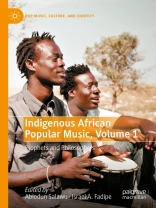This volume explores the nature, philosophies and genres of indigenous African popular music, focusing on how indigenous African popular music artistes are seen as prophets and philosophers, and how indigenous African popular music depicts the world. Indigenous African popular music has long been under-appreciated in communication scholarship. However, understanding the nature and philosophies of indigenous African popular music reveals an untapped diversity which only be unraveled by knowledge of the myriad cultural backgrounds from which its genres originate. Indigenous African popular musicians have become repositories of indigenous cultural traditions and cosmologies.With a particular focus on scholarship from Nigeria, Zimbabwe and South Africa, this volume explores the work of these pioneering artists and their protégés who are resiliently sustaining, recreating and popularising indigenous popular music in their respective African communities, and at the same time propagatingthe communal views about African philosophies and the temporal and spiritual worlds in which they exist.
Innehållsförteckning
Chapter 1: Introduction: Indigenous African Popular Music.- SECTION A: THE NATURE, PHILOSOPHIES AND GENRES OF INDIGENOUS AFRICAN POPULAR MUSIC.- Chapter 2: Indigenous and modern Zimbabwean music: Reflections from Thomas Mapfumo’s Chimurenga music genre.- Chapter 3: Rhythmic signifying in popular Venda music.- Chapter 4: Baansi ni Yila: A critical history of the music industry in Northern Ghana.- Chapter 5: Indigenous and Indigenised Yoruba Popular Music.- Chapter 6: Social Cognition and Advertisement in Yusuf Olatunji’s Music.- Chapter 7: Exploring the value systems embedded in indigenous Yorùbá music genres and Yorùbá nursery rhymes.- Chapter 8: Cultural Frames: Socio-Cultural Metaphors in Owerri-Igbo Bongo Music.- Chapter 9: Thematic Deconstructions of Urhobo/Isoko Musicology and Brand Identity Negotiation, Normalization & Contradictions: Discourse Narrative.- Chapter 10: Dung Chollom and Berom Ethnic Popular Music.- SECTION B: INDIGENOUS AFRICAN POPULAR MUSIC ARTISTES AS PROPHETS AND PHILOSOPHERS.- Chapter 11: Corpus of Prophecy, Philosophy and Crusading in Ayinla Omowura’s Music.- Chapter 12: Forewarned is forearmed: Exploring the apocalyptic voice of popular music in the post-colonial Zimbabwe.- Chapter 13: Reeling Nostalgia: ‘Aremote’ and the enduring Sakara music in Nigeria.- Chapter 14: Celebration as Choice in Nigerian Indigenous and Modern Music: A Critical Analysis of Osondi Owendi by Osita Osadebe and Chinedu Okoli (Flavour).- Chapter 15: Yoruba Socio-Cultural Norms and Values in Selected Songs of Bukola Elemide (Asa).- Chapter 16: Rethinking Values and Principles: An Examination of Osita Osadebe Songs in Igbo Cultural Value Preservation.- SECTION C: INDIGENOUS AFRICAN POPULAR MUSIC AND THE WORLD.- Chapter 17: Valodia: A Transatlantic Praise Song.- Chapter 18: The adaptation of Zimbabwean mbira dzavadzimu music, from traditional to modern popular band format; the case of Thomas Mapfumo.- Chapter 19: Macheso’s Sungura and Socialidentity narratives in Postcolonial Zimbabwe.- Chapter 20: “One Beat, One Pound” – Kasumu Isola Sanni: The Sákárà Master Drummer.- Chapter 21: When Culture and Tradition Aren’t Archaic: The Song Semantics of Zimbabwean Mbira’s International Appeal.
Om författaren
Abiodun Salawu is Professor of Journalism, Communication and Media Studies, and Director of Indigenous Language Media in Africa, at the North-West University, South Africa. His major areas of research include indigenous language media, development communication, critical studies and new media.
Israel A. Fadipe is postdoctorial fellow in Indigenous Language Media in Africa at the Faculty of Humanities, North-West University, South Africa. He specialises in communication, cultural and gender studies, and has published articles and chapters in both local and international journals.












